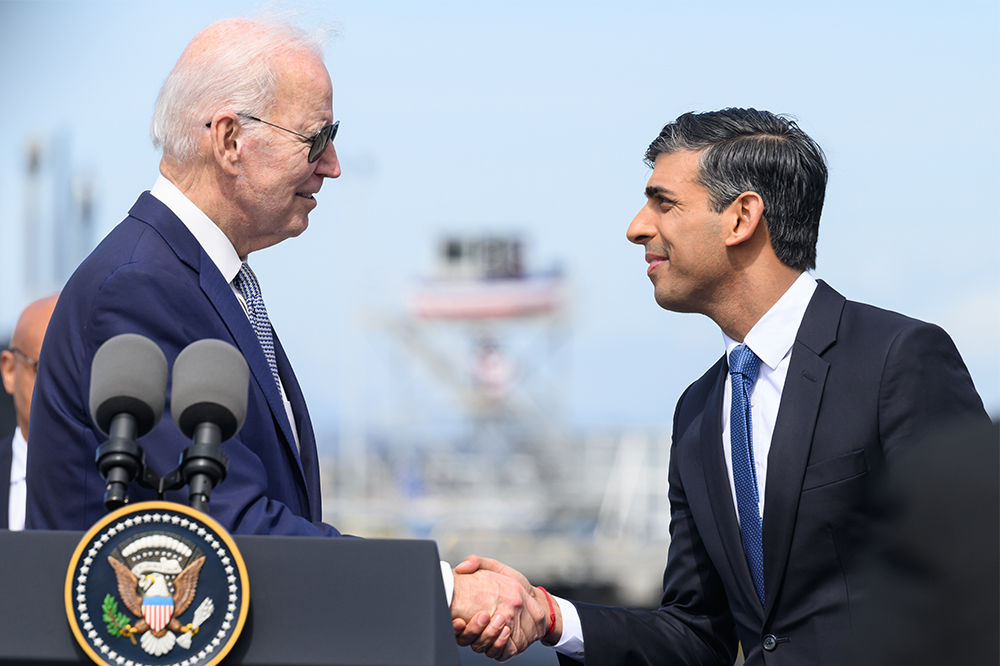There were many potential titles for Liz Truss’s memoir: 49 Days that Shook the World, perhaps, or simply What Happened, like Hillary Clinton’s. Instead, she’s gone for a cri de coeur: Ten Years to Save the West.
Westminster has a long history of drawing inspiration from Washington
Such swashbuckling language is best suited to an American market, and the former prime minister seems to have this in mind. She has declared that her book will appear ‘ahead of the US presidential election’ and explain why it’s vital that ‘conservative arguments win – and the left is defeated’. In the PR so far, Truss has referenced Joe Biden more times than Sunak or Starmer.
It’s not just that the American book market is more lucrative. Truss wants her brand of Conservatism to influence the political debate in the US. But for the first time in decades, the British and American electoral cycles are on course to coincide, and un-happily for Truss, any effect British thinking has on America is bound to be eclipsed by America’s effect on us.

Unless the Tories’ fortunes drastically improve, there’s little chance of the British election coming any earlier. As long as Sunak is languishing in the polls, he will want to push polling day back to late autumn of next year (‘Actually January 2025 looks good,’ jokes a senior party figure). An election next November, after another party conference, would allow the party to fill up its coffers, and conference could also be used as a campaign launch pad.
The two countries haven’t held elections in the same year since 1992, and the campaigns haven’t overlapped since 1964, when Harold Wilson narrowly beat Alec Douglas-Home while Lyndon B. Johnson won in a landslide against Barry Goldwater, with the largest share of the popular vote for the Democratic party in its history. Goldwater’s hardline small government, anti-communist rhetoric flopped under LBJ’s criticism: ‘In your guts, you know he’s nuts.’
This time around, the American contest is likely to be a lot tighter. Joe Biden and Donald Trump are the bookies’ favourites to fight it out once again, and the polls indicate that the result is too close to call. The prospect of Joe vs Don has an effect here too. ‘It will cast a shadow on the UK campaign,’ says a Labour figure. As soon as one of them looks more dominant, they will start to exert a strong influence on their counterpart here. ‘Once it gets to the head-to-head stage in America, whichever candidate is in front will mean pressure on the UK equivalent to ape their message,’ adds a senior Tory.
Westminster has a long history of drawing inspiration from Washington. It was Bill Clinton’s New Democrats that inspired Blair’s New Labour. Even now, Keir Starmer rarely misses an opportunity to draw comparisons between his Labour party and Joe Biden’s Democrats. His shadow cabinet embark on frequent, ostentatious trips to DC.
Labour wants to present itself as part of a global centre-left revival – Reeves’s ‘Securonomics’ is a deliberate echo of Bidenomics. Earlier this summer, key members of Starmer’s team, including his campaign director Morgan McSweeney, flew to Washington to speak to Democrat aides about how the left can win.
Transatlantic relations are a little more complicated for the Conservatives. If Trump prospers as the Republican candidate, the right of the Tory party will heap pressure on Sunak to be more robust on tax cuts and immigration. Sunak has yet to embrace Trump, but he has found Republican inspiration in Mitt Romney, the former presidential candidate who, like Sunak, knows what it is like to be called robotic and so rich as to be out of touch. Romney is top of No. 10’s wish list for speakers at next month’s Tory conference in Manchester. The two teetotallers hit it off when they met in Washington, and exchanged numbers.
Trump’s return to the White House would be a headache for everyone. For all the praise that Trump lavished on Boris Johnson, Downing Street often found the whole arrangement more stressful than useful. No one knew how the US president would ever react until the last minute.
If Starmer becomes PM, he’ll have an uncomfortable time trying to make peace with The Donald, who doesn’t forget a slight. Five years ago Starmer said that Trump had no understanding of the two words ‘humanity and dignity’. David Lammy, the would-be foreign secretary, went further. He led the protests against Trump’s 2018 London visit, telling protestors in Trafalgar Square that they were ‘on the right side of history’.
‘Starmer’s previous comments show a level of ignorance and immaturity,’ argues a Downing Street source. Sunak’s approach will be to remain above the fray. He will talk about the need for close relations with whoever wins in the States, rather than getting drawn into personality politics.
The next complicated issue is green energy. Labour has been trying to learn the lessons of Biden when it comes to net zero. ‘Biden made green industrial policy,’ says a seasoned Labour aide. ‘It’s what we need to do.’ But after a summer of dithering on net zero, Sunak is facing calls from the One Nation wing of his party to follow America’s example and sell net zero to industrial communities (i.e., with lots of spending). ‘The worry is it will give Ed Miliband greater currency,’ says one Tory MP. ‘Biden has shown how net zero can be pitched.’
The biggest issue likely to arise from the US campaign is security. The Republicans and Democrats, Tories and Labour are all broadly aligned on China, but the Republican base is more uncertain about Ukraine. Trump now routinely decries the cost to America of funding the conflict and has said he could end the war in a day. Neither the Tories nor Labour will adopt this rhetoric – both want to talk up their commitment to Kyiv. The prospect of Trump telling Europe to fight its own wars terrifies most of its leaders. It means foreign policy may play a bigger role than expected. The party that voters trust most on defence could have the edge.







Comments